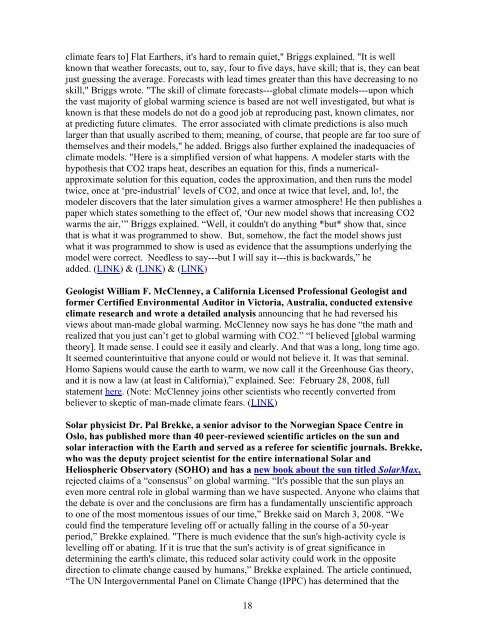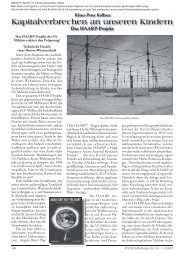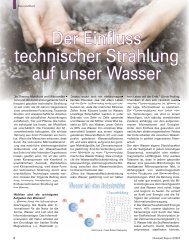U. S. Senate Minority Report: - Klimaforschung
U. S. Senate Minority Report: - Klimaforschung
U. S. Senate Minority Report: - Klimaforschung
Create successful ePaper yourself
Turn your PDF publications into a flip-book with our unique Google optimized e-Paper software.
climate fears to] Flat Earthers, it's hard to remain quiet," Briggs explained. "It is well<br />
known that weather forecasts, out to, say, four to five days, have skill; that is, they can beat<br />
just guessing the average. Forecasts with lead times greater than this have decreasing to no<br />
skill," Briggs wrote. "The skill of climate forecasts---global climate models---upon which<br />
the vast majority of global warming science is based are not well investigated, but what is<br />
known is that these models do not do a good job at reproducing past, known climates, nor<br />
at predicting future climates. The error associated with climate predictions is also much<br />
larger than that usually ascribed to them; meaning, of course, that people are far too sure of<br />
themselves and their models," he added. Briggs also further explained the inadequacies of<br />
climate models. "Here is a simplified version of what happens. A modeler starts with the<br />
hypothesis that CO2 traps heat, describes an equation for this, finds a numericalapproximate<br />
solution for this equation, codes the approximation, and then runs the model<br />
twice, once at ‘pre-industrial’ levels of CO2, and once at twice that level, and, lo!, the<br />
modeler discovers that the later simulation gives a warmer atmosphere! He then publishes a<br />
paper which states something to the effect of, ‘Our new model shows that increasing CO2<br />
warms the air,’” Briggs explained. “Well, it couldn't do anything *but* show that, since<br />
that is what it was programmed to show. But, somehow, the fact the model shows just<br />
what it was programmed to show is used as evidence that the assumptions underlying the<br />
model were correct. Needless to say---but I will say it---this is backwards,” he<br />
added. (LINK) & (LINK) & (LINK)<br />
Geologist William F. McClenney, a California Licensed Professional Geologist and<br />
former Certified Environmental Auditor in Victoria, Australia, conducted extensive<br />
climate research and wrote a detailed analysis announcing that he had reversed his<br />
views about man-made global warming. McClenney now says he has done “the math and<br />
realized that you just can’t get to global warming with CO2.” “I believed [global warming<br />
theory]. It made sense. I could see it easily and clearly. And that was a long, long time ago.<br />
It seemed counterintuitive that anyone could or would not believe it. It was that seminal.<br />
Homo Sapiens would cause the earth to warm, we now call it the Greenhouse Gas theory,<br />
and it is now a law (at least in California),” explained. See: February 28, 2008, full<br />
statement here. (Note: McClenney joins other scientists who recently converted from<br />
believer to skeptic of man-made climate fears. (LINK)<br />
Solar physicist Dr. Pal Brekke, a senior advisor to the Norwegian Space Centre in<br />
Oslo, has published more than 40 peer-reviewed scientific articles on the sun and<br />
solar interaction with the Earth and served as a referee for scientific journals. Brekke,<br />
who was the deputy project scientist for the entire international Solar and<br />
Heliospheric Observatory (SOHO) and has a new book about the sun titled SolarMax,<br />
rejected claims of a “consensus” on global warming. “It's possible that the sun plays an<br />
even more central role in global warming than we have suspected. Anyone who claims that<br />
the debate is over and the conclusions are firm has a fundamentally unscientific approach<br />
to one of the most momentous issues of our time,” Brekke said on March 3, 2008. “We<br />
could find the temperature leveling off or actually falling in the course of a 50-year<br />
period,” Brekke explained. "There is much evidence that the sun's high-activity cycle is<br />
levelling off or abating. If it is true that the sun's activity is of great significance in<br />
determining the earth's climate, this reduced solar activity could work in the opposite<br />
direction to climate change caused by humans,” Brekke explained. The article continued,<br />
“The UN Intergovernmental Panel on Climate Change (IPPC) has determined that the<br />
18





